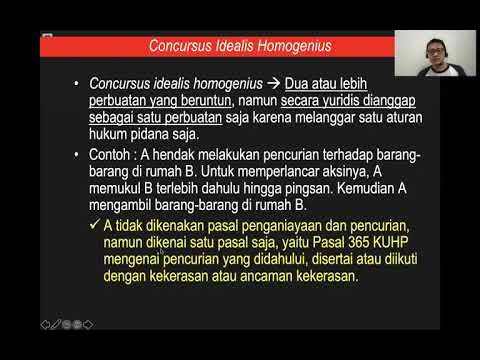GABUNGAN TINDAK PIDANA
Summary
TLDRThis video delves into the concept of 'gabungan tindak pidana' (combination of criminal acts) in Indonesian criminal law. It explores how multiple offenses committed by a single individual are handled, focusing on terms like concursus idealis and concursus realis. The video explains how criminal acts are classified, with penalties either absorbed or accumulated based on the nature of the offenses. It also discusses recidivism and continuous acts, highlighting how sentencing can be adjusted depending on whether the acts are related or separate. Overall, the content offers a detailed look at the complexities of sentencing in cases involving multiple crimes.
Takeaways
- 😀 Concursus (concurrence of crimes) refers to the situation where a person commits multiple offenses in one or several acts, and it plays a key role in determining sentencing.
- 😀 Concursus Idealis occurs when a single act violates multiple legal provisions, like a single act of rape in a public place violating both *Pasal 281* (public indecency) and *Pasal 285* (rape).
- 😀 Concursus Realis occurs when multiple separate acts result in individual criminal offenses, such as committing multiple thefts or murders.
- 😀 The principle of Absorption means that a lighter offense may be absorbed into a more serious offense when determining penalties.
- 😀 The Accumulation principle allows penalties to be added together for multiple offenses, but this is usually capped by the most severe penalty.
- 😀 Aggregation refers to the adjustment of sentences based on the severity of the offenses, with certain rules limiting how penalties can be combined or adjusted.
- 😀 Concursus Idealis is divided into two categories: Homogenous (same legal provision violated multiple times) and Heterogenous (different legal provisions violated in one act).
- 😀 In Homogenous Concursus Idealis, one act may violate a single legal provision more than once, like a single shooting resulting in the death of two people.
- 😀 In Heterogenous Concursus Idealis, one act may violate multiple legal provisions, such as an assault on a public official while committing other crimes.
- 😀 Recidivism, or repeat offenses, leads to harsher penalties, often increasing the sentence by a third, and continuous offenses may be treated as a single offense for sentencing purposes.
Q & A
What is *gabungan tindak pidana* in Indonesian criminal law?
-Gabungan tindak pidana refers to a situation where a person commits multiple criminal acts, which can result in the application of more than one criminal charge. This concept examines how multiple offenses are handled in terms of punishment and legal classification.
What is the difference between *concursus idealis* and *concursus realis*?
-*Concursus idealis* (ideal concurrence) occurs when a single act violates multiple criminal laws, while *concursus realis* (real concurrence) refers to situations where a person commits multiple acts, each violating a separate legal provision, and each act is treated as a separate offense.
What does *concursus idealis homogenous* mean?
-*Concursus idealis homogenous* refers to a single act that violates multiple provisions of the same type or category of crime. For example, one act of shooting someone might violate multiple murder laws because it causes the deaths of multiple victims.
What is *concursus idealis heterogenous*?
-*Concursus idealis heterogenous* occurs when one act violates provisions from different categories of crime. An example would be a person committing both an act of theft and an act of assault in a single incident.
How does *concursus realis* differ from *concursus idealis* in terms of punishment?
-*Concursus realis* involves separate criminal acts, each of which is treated independently and punished according to its own severity. In contrast, *concursus idealis* involves one act that may be punished under multiple provisions, often resulting in a more complex evaluation of punishment.
What does the concept of 'absorption' in sentencing mean in the context of *concursus realis*?
-Absorption refers to a situation in which the penalties for multiple criminal acts are absorbed into the penalty of the most serious crime, effectively reducing the total punishment by eliminating overlap or repetition of sentencing.
What is meant by 'punishment accumulation' in the context of *concursus realis*?
-Punishment accumulation refers to the practice of adding the sentences for multiple crimes together. This is typically done when the offenses are of different types, and each offense is treated as an individual act, leading to a cumulative sentence.
What is a *perbuatan berlanjut* (continuous act) in criminal law?
-A *perbuatan berlanjut* is a continuous act that consists of multiple related criminal actions occurring over a period of time, which are regarded as a single, continuous criminal act rather than separate offenses.
What is the role of 'residivism' in sentencing, according to the script?
-Residivism refers to the tendency of a criminal to repeat offenses. In sentencing, a repeat offender (residivist) may face an increased penalty as a result of their previous convictions and ongoing criminal behavior.
How is the punishment determined when a person commits multiple crimes under *concursus realis heterogenous*?
-In *concursus realis heterogenous*, when a person commits different crimes (e.g., theft, assault, and murder), the punishment is based on the most serious crime, with the penalty for other crimes potentially added to it, but the total sentence cannot exceed the most severe penalty plus a third of the other penalties.
Outlines

このセクションは有料ユーザー限定です。 アクセスするには、アップグレードをお願いします。
今すぐアップグレードMindmap

このセクションは有料ユーザー限定です。 アクセスするには、アップグレードをお願いします。
今すぐアップグレードKeywords

このセクションは有料ユーザー限定です。 アクセスするには、アップグレードをお願いします。
今すぐアップグレードHighlights

このセクションは有料ユーザー限定です。 アクセスするには、アップグレードをお願いします。
今すぐアップグレードTranscripts

このセクションは有料ユーザー限定です。 アクセスするには、アップグレードをお願いします。
今すぐアップグレード5.0 / 5 (0 votes)






